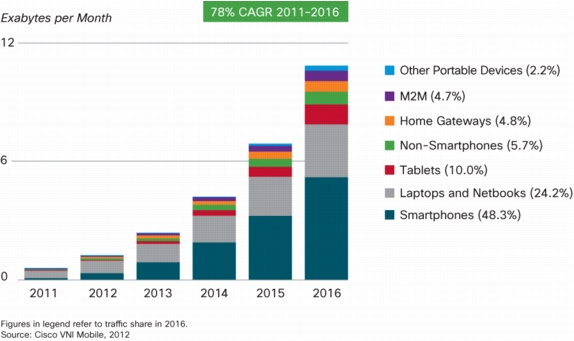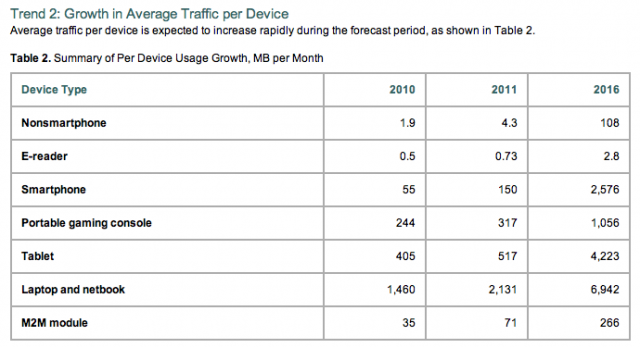The demand of mobile devices are tremendously increasing year-over-year. Users are more relying on their mobile devices for online shopping rather than to present physically in the retail stores. Huge number of commercial ads, increasing demand of mobile apps, and mobile online shopping have created stringent mobile data traffic worldwide. Recently, a data firm “Cisco” has reportedly stated in its “Visual Networking Index (VNI) Global Data Traffic Forecast Update” that the mobile data traffic had been increased by 2.3 times last year—more than double in fourth year in a row. The firm has also revealed that the mobile data traffic grew by more than 8 times in 2011 (597 petabytes) compare to the total global internet traffic in 2000 (75 petabytes).
Cisco has explained that the number of mobile-connected devices will exceed the number of population worldwide by the end of 2012. The firm has estimated that 25% of the world population will have two or more than two mobile devices in their hands by the end of 2016.
The mobile video has accounted more than 50% traffic first time this year and it’s being expected that the mobile videos viewing will exceed 70% of mobile on line traffic by the end of 2016. Only 0.2% of the global mobile connections have been connected with the 4G network, despite of this, it accounts 6% of mobile data traffic. It’s expected that 6% of all mobile connections will have 4G connection by 2016—which would create 36% of the total mobile data traffic.
The firm has noticed that cloud applications and services—Netflix, YouTube, Pandora, and Spotify—are going to make more mobile data traffic in upcoming years. The report states that the mobile devices with Netflix, Pandora, and Facebook are going to boost more than the twice the mobile data traffic than the devices having email and web applications alone. Astoundingly, the cloud applications will account 71% (7.6 exabytes per month) of the total mobile data traffic in 2016, compared to 45% (269 petabytes per month) at the end of 2011.
The number of Smartphone users were outstandingly increased in 2011, and resulted average 150 MB per month of traffic per Smartphone—up from 55 MB per month in 2010. The firm has depicted that the average mobile data traffic per Smartphone will reach 2.6 GB per month—a 17-folds from the average mobile data traffic in 2011.
Despite a storm of Smartphone, the mobile market is still dominated by the feature phones in number. Feature phone accounted a major (88%) of the mobile landscape in 2011, however, data consumption were increased by 2.3 folds to 4.3MB from 1.9 MB in 2010.
The number of mobile connected Tablets increased by three-folds to 34 million last year compare to 2010. The Tablets accounted 3.4 times more data traffic last year—the average data consumption per Tablet was 517 MB per month in 2011, more than 150 MB per month a year ago.
In terms of mobile data traffic, Android is dominating over other mobile operating system. Due to the stranglehold of Android mobile operating system in the mobile markets—currently, every second Smartphone is Android-based—than other mobile OS, Google’s mobile OS is going to lead in the mobile data traffic. The firm has elaborated that the mobile device data consumption of Android-based Smartphones are 29% higher than Apple iPhones in terms of MB data used per month last year.
Overall, the data report has demonstrated that how the mobile data traffic is increasing year-by-year. The increasing penetration of Smartphones and Tablets worldwide will soar the data consumption number of times compare to the present. The report has clearly stated that 6% of mobile connections will have 4G connections by the end of 2016; undoubtedly, it will increase the average data consumption per mobile devices.
Source: Cisco Visual Networking Index







